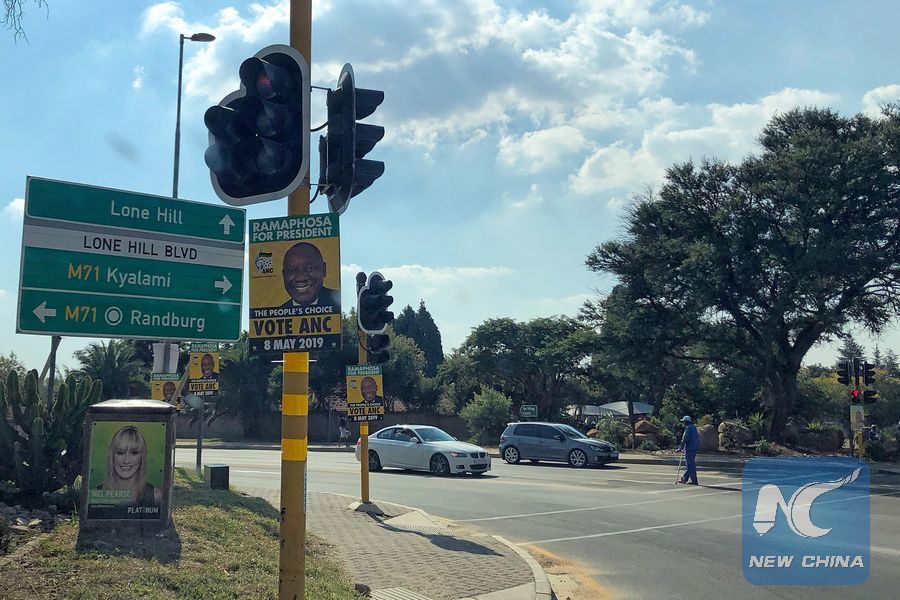
Photo taken on May 7, 2019 shows South Africa's ruling party ANC putting up campaign boards for the May 8 elections. (Xinhua/Chen Cheng)
JOHANNESBURG, May 7 (Xinhua) -- With over 26 million South Africans expected to head to the polls on Wednesday, three major political parties have intensified their campaigns to woo voters, especially those still undecided.
This is South Africa's sixth general national election since the first one in 1994.
With various polls showing that no political party would get an outright majority win in South Africa's economic hub Gauteng province, parties shifted their focus on the province this past weekend.
Both the African National Congress (ANC), Economic Freedom Fighters (EFF) held their major rallies on Sunday in Gauteng, while the Democratic Alliance (DA) hosted its rally on Saturday as they are attempting to garner major support in the province.
The latest poll by the Institute for Race Relations (IRR) has shown the ANC would receive over 53 percent of votes nationally, with the DA likely to obtain 24 percent and the EFF 14 percent, if the turnout is 70 percent.
IRR's head of politics and governance Gareth van Onselen said the remaining time was crucial for parties to consolidate support.
"Also, this poll is not a prediction. There is still fluidity, especially where the ANC and EFF are concerned. Final days could see some movement," van Onselen said.
Political analyst Shadrack Gutto told Xinhua that the ANC could no longer rely on its glorious past to win support, but it should root out corruption and widespread looting that became a norm under former President Jacob Zumba's administration.
"The balance of power is not on the ANC's favor in Gauteng. This is a party of Nelson Mandela, OR Tambo, but young people are not keen on voting for the past," he said. "The party can't be resting on the laurels of its past leaders."
Polls predict that the EFF is the only political party set to grow its support during the elections.
Established six years ago by former ANC Youth League President Julius Malama, it obtained over 6 percent of votes in its first election in 2014 and its support is predicted to be at 14 percent this time. The DA is likely to grow its support by 2 percent from its 22 percent previous performance.
Gutto cited EFF's great mobilization ability and young leadership as some of the reasons behind its growth.
"EFF has been great at mobilizing at grassroots level. They have been able to reach out to the youth voters because they are led by the youth," Gutto said. He said the party has been able to "invigorate parliament."
Some have expressed concerns about the dwindling number of young people participating in this year's election.
During registration period, the Independent Electoral Commission (IEC) visited universities' campuses to encourage young people to vote, but the number of the youth registered to vote has declined since 2014.
There are 341,236 youth between 18 and 19 registered to vote on Wednesday, but this figure was at 643,133 in 2014. Among those aged between 20 to 29, it has decreased from 5,759,236 to 5,299,297.
Gutto said that socio-economic problems mostly impacting the youth were to be blamed for the decline. "Young people are dissatisfied. Corruption is going up, unemployment is growing and it affects the youth. They are the one's entering the job market," he said.
Meanwhile, the IEC said the record number of political parties set to contest in the May 8 election has placed "demand and pressures" on it. South Africa's current electoral system permits people to be chosen as public representatives on political party tickets and not as individuals.
"It's a political party that then chooses its leader of the country through the propositional representation system," Gutto added.
As voting nears, IEC has urged calm and vigilance, saying parties should ensure that elections take place without any disturbances.
Domestic and international observers to monitor the elections have been deployed. Parties contesting the election would be permitted to deploy two party agents to oversee and monitor the voting process and counting.

